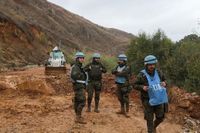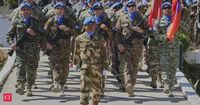The fate of the United Nations Interim Force in Lebanon (UNIFIL) is hanging in the balance as the mandate for the peacekeeping mission nears its expiration at the end of August 2025. The looming decision on whether to renew, scale back, or end the mission has exposed deep divisions between the United States and its European allies, with far-reaching implications for regional security in the Middle East and the future of international peacekeeping operations.
UNIFIL was originally established in 1978 to oversee the withdrawal of Israeli troops from southern Lebanon following Israel’s invasion. Its mission was expanded after the devastating 2006 war between Israel and Hezbollah, the Iranian-backed militant group, to include monitoring the cessation of hostilities and supporting the Lebanese Armed Forces. For decades, the multinational force—currently comprising around 10,000 peacekeepers—has played a pivotal role in maintaining a fragile calm in southern Lebanon, including during the intense 2024 conflict between Israel and Hezbollah. Yet, as the mission’s renewal approaches, its effectiveness and future are being hotly debated on the world stage.
The Trump administration, which returned to office in 2025, has made no secret of its skepticism toward UNIFIL. According to the Associated Press, political appointees in Washington, including Secretary of State Marco Rubio, have argued that the mission is “an ineffectual waste of money that is merely delaying the goal of eliminating Hezbollah’s influence and restoring full security control to the Lebanese Armed Forces that the government says it is not yet capable of doing.” After securing major cuts in U.S. funding for the peacekeeping force, Rubio signed off in mid-August on a plan to wind down and end UNIFIL within the next six months, as confirmed by administration officials and congressional aides familiar with the discussions.
This hardline stance is part of a broader shift in U.S. foreign policy, marked by a scaling back of international commitments and a more transactional approach to alliances and multilateral institutions. The United States has also expressed skepticism about other international endeavors, from the conflict in Ukraine to global technology and trade partnerships. Yet, the move to pull back from Lebanon has not gone uncontested.
European nations, especially France and Italy, have pushed back strongly against a rapid American-led withdrawal. They argue that ending UNIFIL prematurely would create a dangerous security vacuum in southern Lebanon—one that Hezbollah could quickly exploit. As reported by Reuters and The Economic Times, French diplomats have pointed to the cautionary example of Mali, where the withdrawal of a U.N. mission before local forces were ready allowed extremist groups to seize territory. “The European argument was that prematurely ending UNIFIL before the Lebanese army is able to fully secure the border area would create a vacuum that Hezbollah could easily exploit,” the Associated Press noted.
Through intensive diplomatic efforts, France and Italy, with the backing of U.S. ambassador to Turkey and envoy to Lebanon Tom Barrack, successfully lobbied for a compromise: a one-year extension of the peacekeeping mandate, followed by a six-month wind-down period. Even Israel, which has long sought an end to UNIFIL’s mandate and has accused the mission of turning a blind eye to Hezbollah’s activities, reluctantly agreed to the extension, according to officials speaking to the Associated Press.
However, a final agreement remains elusive. The French draft resolution, obtained by the Associated Press, proposes a one-year extension but does not set a specific date for UNIFIL’s withdrawal. Instead, it expresses the Security Council’s “intention to work on a withdrawal.” U.S. officials have insisted that a firm deadline is necessary for their support, while France and its allies resist setting a date that could undermine stability. As the clock ticks toward the Security Council vote at the end of August, the two sides remain at odds over this crucial detail.
Complicating matters further, the U.N. system faces drastic budget cuts, which could force a reduction in the size of the peacekeeping mission even if its mandate is renewed. One option being considered, according to a U.N. official speaking anonymously to The Economic Times, is to reduce the number of peacekeepers while increasing the use of technology to monitor the situation on the ground.
On the ground, UNIFIL continues to face criticism from all sides. Hezbollah supporters in Lebanon have frequently accused the mission of colluding with Israel and have occasionally attacked peacekeepers on patrol. Israel, on the other hand, has accused UNIFIL of ignoring Hezbollah’s military activities and lobbied for its mandate to end. Sarit Zehavi, a former Israeli military intelligence analyst and founder of the Alma Research and Education Center, told the Associated Press, “UNIFIL has played a damaging role with regard to the mission of disarming Hezbollah in south Lebanon.” Zehavi pointed to the discovery of Hezbollah tunnels and weapons caches near UNIFIL facilities during and after last year’s Israel-Hezbollah war, when much of the group’s senior leadership was killed and its arsenal significantly reduced.
Despite these criticisms, UNIFIL has continued to report the discovery of unauthorized weapons—including rocket launchers, mortar rounds, and bomb fuses—to the Lebanese army, as confirmed by U.N. spokesman Stephane Dujarric. Under the terms of a U.S.- and France-brokered ceasefire, Israel and Hezbollah were supposed to withdraw from southern Lebanon, with the Lebanese army, supported by UNIFIL, taking control. Yet, Israel still occupies five strategic positions on the Lebanese side of the border and carries out near-daily airstrikes, which it claims are necessary to prevent Hezbollah from regrouping.
Lebanese officials, for their part, have consistently called for UNIFIL to remain, arguing that the country’s cash-strapped and overstretched army is not yet able to patrol the full area on its own. Retired Lebanese Army Gen. Khalil Helou warned that an abrupt end to the mission could destabilize Lebanon, especially along the porous border with Syria, where smuggling is rampant. “UNIFIL is maybe not fulfilling 100% what the Western powers or Israel desire. But for Lebanon, their presence is important,” Helou told the Associated Press.
The United Nations itself maintains that the peacekeepers are critical to regional stability. UNIFIL spokesperson Andrea Tenenti emphasized, “We are here to assist the parties in implementation of the mission’s mandate and we’re waiting for the final decision.” Ultimately, the decision on renewal rests with the U.N. Security Council, and as the deadline approaches, all parties are bracing for a consequential vote that could reshape the security landscape of southern Lebanon—and perhaps set a precedent for the future of peacekeeping worldwide.
As the debate rages on, one thing is clear: the question of UNIFIL’s future is about much more than a single mission. It is a test of international resolve, the durability of alliances, and the world’s willingness to invest in peace amid uncertainty and shifting priorities.



